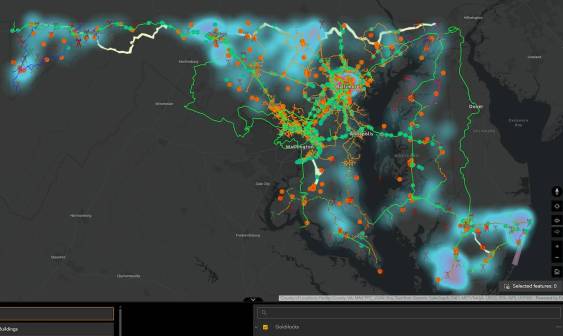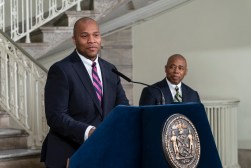
Cities have a unique place in the government tech ecosystem. They’re not any more important than counties, states, or federal agencies, but they are the most alive. Cities are the symbols and actual manifestations of opportunity and advancement. People move to the country to settle down. They move to the city because they have a dream to chase.
The cities featured here are those that have adopted the mostforward-thinking strategies to connect their people.These are the thought leaders.Unicefprojectedthat 70 percent of the earth’s inhabitants will live in urban areas by the year 2050. The trend toward global urbanization, along with the individual programs featured in this list point toward a technological future in which cities are the change makers.
These citiesshow thatbroadband is just the beginning:

Chicago
In 2012, Chicago MayorRahm Emanuel made bold commitments to connectivity the city has beenbuilding towardever since. TheChicago Broadband Challengelaunched the city’s earlyWi-Fi efforts, giving citizens access in the city’s parks and open spaces. Programs like Comcast Internet Essentials, Internet to Go,CyberNavigators, and Connect Chicago help educate citizens, deliver new connectivity to institutions, and allow families to rent equipment like laptops and Wi-Fi hotspots. The city is now building on its core infrastructure with an eye to the future a pilot project will soon bringfive Wi-Fi kiosksto the city’s downtown area. Three other pilots will bring new kiosks and big data capabilities toO’Hare International Airport and city bus stops. Through the mayor’sChicago Tech Plan, the city made a commitment to “next-generation infrastructure” and a codified a willingness to encourage technological experimentation within the city. To that end, the city’s Array of Things, a growing sensor-based research network explores the future of urban connectivity.

New York
Broadband internet access is no longer a luxury, but “a requirement,”accordingto the city’s website. Through a portfolio of broadband commitments that span from Wi-Fi kiosks to free and low-cost networks serving low-income communities, New York City is both a leader and a trend-setter in connectivity. LinkNYC, the city’s Wi-Fi kiosk network, is among the most ambitious technology projects in the world, with plans to install7,500 kiosks by 2024. The giantproject has since inspired a handful of other cities to follow suit vendor CIVIQ Smartscapes reports ongoing talks or contracts with more than a dozen cities. Mayor Bill de Blasio’sOneNYCinitiative identified a growing digital divide and set of a goal of connecting all New Yorkers to the internet by 2025.In 2015, the city launched an initiative to deliver free broadband to 21,000 public housing residents. The city also launched abroadband innovation pilot, collecting 69 proposals from vendors with new ideas on how to increase connectivity. In 2016, the city reported allocating $4 million to bring broadband to five industrial business zones in Brooklyn and Queens.

Chattanooga
Just by its reputation alone, Chattanooga has done more for broadband than most. A city-run gigabit network that offers its residents one of the fastest connections in the nation is the most frequentlycited example that municipal fiber can thrive if given the proper attention and care. Serving a population of more than 170,000 residents, the network has become a Mecca for internet fanatics since it launched in 2009. Chattanooga’s example has since been followed bya growing numberof communities that have builtfiber-to-the-home networks.A studyby economists at theUniversity of Tennessee at Chattanooga found that between 2011 and 2015, the network generated 2,800 new jobs and as much as $1.3 billion for the local economy.

San Francisco
In March 2016, city Supervisor Mark Farrell released a report nudging the city toward a public-private partnership to build an open-access fiber network for citywide internet access. Since then, Google Fiber has announced plans to move in and offer gigabit service. AT&T launched gigabit service. The recent expansions are an extension of the city’s commitment to connectivity and a history of free Wi-Fi in the city’s parks, plazas and public spaces. In 2014, Google gave the city a check for $608,000 to invest in Wi-Fi. San Francisco isa rare instanceof a city with multiple high quality ISPs competing for market share. With the city now looking for a new chief information officer, how city leaders will handle continued broadband and connectivity growth remains to be seen. Traditionally a technology leader and bastion of free expression and thought, it’s hard to imagine San Francisco won’t finally deliver on it’s repeated pledges to bring high-speed internet access to all.

Seattle
After a couple false starts and a failed partnership with Gigabit Squared, the year 2014 brought Seattle Mayor Ed Murray into office, and he turned over all the cards. Since then, the city has repealed Department of Transportation building rules that were preventing competition from building out their networks. Companies like Century Link and Wave took advantage of the rule change and expanded their gigabit service offerings, which are now available to more than 60 percent of households in the city. Other providers began offering free speed upgrades. Soon after these private investments, the city reported having the highest ratio of FTTH connections-to-residents in the country.Maps publishedon the city’s website reveal a similar story of rapid growth. The mayor’s pledge to deliver equal and affordable internet access was followed by a municipal feasibility study in 2015, and while the study found a government-run network would betoo expensive, the city never totally closed the door on the idea of partnership. Murray pledged to make the citya national leader, and in January Seattle released arequest for informationthat the city now reports is yielding promising technologies and partnerships it might pursue. Abroadband speed test tooloffered by the city shows residents how neighborhoods and their own connections are performing, and if the city’s commitment to connectivity holds, the people who use that tool will watch their internet speeds and their neighbors’ go up and up as the years wear on.







